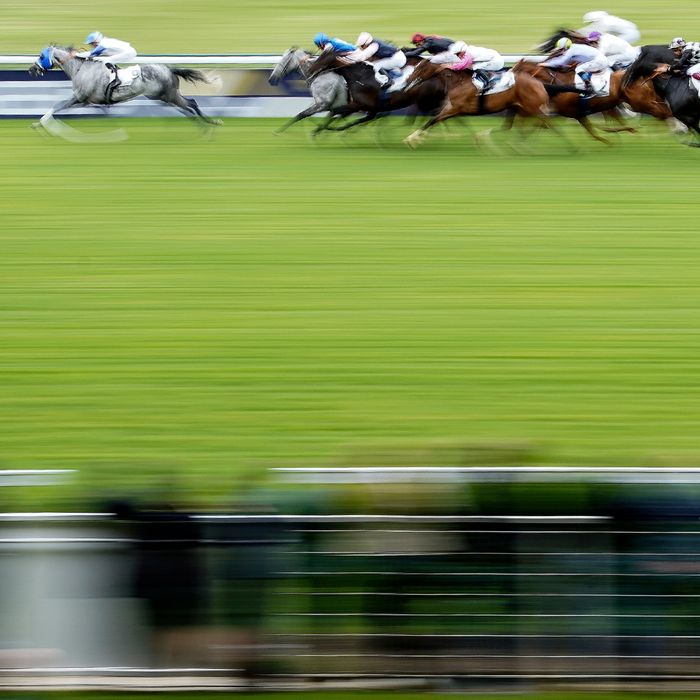
Having recently looked at Joe Biden’s polling lead over Donald Trump and assessed its relative durability, I thought it would make sense to look at the numbers from Trump’s perspective — in terms of the gains he would need to make in order to have a punter’s chance at reelection. Fortunately, political scientist Alan Abramowitz took on this chore and showed why the two numbers to watch between now and November are Trump’s overall job approval rating and his specific job approval rating for handling the coronavirus pandemic.
Why just those numbers? Well, for one thing, there are several reasons why the meat-and-potatoes of many predictive models for presidential elections (including Abramowitz’s own) don’t seem to be relevant this year:
Although the U.S. economy is currently experiencing a severe downturn, with real GDP plunging by an almost unprecedented amount in the second quarter, voters do not appear to hold the incumbent president responsible for this. That is undoubtedly because the recession was deliberately induced in order to try to control the spread of the deadly coronavirus. Thus, despite a massive rise in unemployment and decline in real GDP, President Trump’s approval ratings on handling the economy have generally remained positive.
It is also the case that over the past 10-20 years, assessments of economic conditions have become increasingly divided along party lines, with supporters of the president’s party consistently rating the state of the economy much more positively than supporters of the opposition party. Thus, immediately after Donald Trump took office, Republicans’ assessments of economic conditions became much more positive while Democrats’ assessments of economic conditions became much more negative. This growing partisan divide in how voters view economic conditions means that economic trends may have less impact on election results than in the past.
That’s the good news for Trump. The bad news is that his overall job approval ratings have correlated with his approval ratings for how he has handled the pandemic, which have been going steadily south (from 48 percent in early April, according to the RealClearPolitics averages, to 39 percent now).
Putting causality aside for a moment, Abramowitz also looks at the overall job approval ratings of the ten most recent incumbent presidents running for a second term, and finds that all the winners had positive ratios the month before they were reelected; all those with negative ratios prior to the election lost. The last time either of the polling average services (RealClearPolitics and FiveThirtyEight) showed Trump with a positive ratio was on February 1, 2017.
If everything breaks his way, what can he reasonably be expected to gain? Well, Abramowitz looks at the late June and October job approval ratios for the past ten incumbent presidents running for reelection and finds just one (Richard Nixon in 1972) who made a double-digit gain in that stretch of time (11 percent, to be exact). In late June, Trump’s approval ratio (according to both RCP and FiveThirtyEight, as it happens) was -15. So he’d need to make unprecedented late-cycle gains to become truly competitive. And according to Abramowitz’s logic, that would require big improvements in perceptions of Trump’s handling of the pandemic.
It’s worth thinking about the comparison of Nixon ‘72 and Trump ‘20. In 1972, The Tricky One was benefiting from a deliberately inflated economy, false signs the Vietnam War was coming to a close, and an imploding Democratic Party (partially attributable to GOP dirty tricks) that seemed to be pushing swing voters in Nixon’s direction. It’s unclear how Trump can emulate that trajectory with the necessary speed.
Still, Abramowitz warns that we cannot count Trump out. Even if his approval ratio remains at -15 in October, Abramowitz’s model gives him a nine percent chance of reelection. That’s more than some wizards gave him in 2016. But evidence suggests that Trump will need to stop launching wild attacks on Biden, mail-in voting, and the media and just do his job if he wants to keep it. Unfortunately, his job usually seems to be the last thing on his mind.
"need" - Google News
August 05, 2020 at 07:06PM
https://ift.tt/31ljFjN
How Much Ground Does Trump Need to Make Up to Make This a Race? - New York Magazine
"need" - Google News
https://ift.tt/3c23wne
https://ift.tt/2YsHiXz
Bagikan Berita Ini















0 Response to "How Much Ground Does Trump Need to Make Up to Make This a Race? - New York Magazine"
Post a Comment